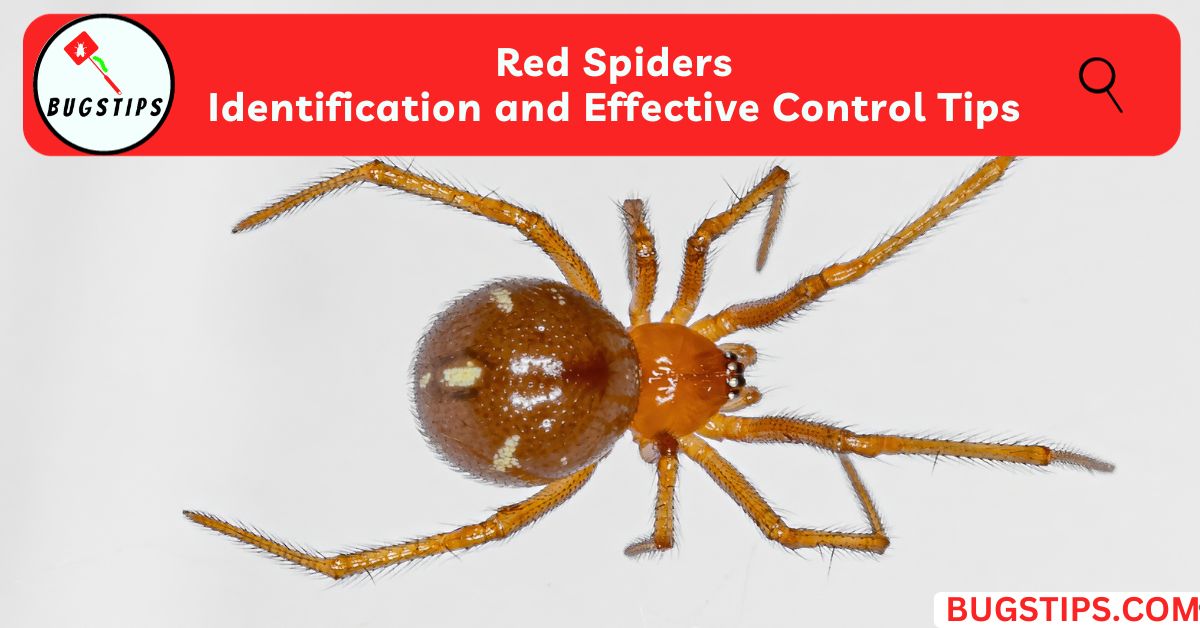This post may contain affiliate links which means as an Amazon Associate, this site may earn a small commission on qualified purchases made through links at no extra cost to you. Learn more on Affiliate Disclosure
Have you ever had the unpleasant surprise of discovering ants crawling out of your electrical outlets? It’s not only unsettling but can also be dangerous for both you and your electrical equipment.
Ants are attracted to electrical outlets for various reasons, and if left unchecked, they can cause significant damage to your wiring and other electrical components. But don’t worry, in this article, we’ll provide you with practical solutions on how to get rid of ants in electrical outlets and prevent them from coming back.
Keep reading to learn about the types of ants that typically invade electrical equipment, the risks associated with having ants in your outlets, and how to remove them safely and effectively. Let’s get started!
Why Are Ants Attracted to Electrical Outlets?
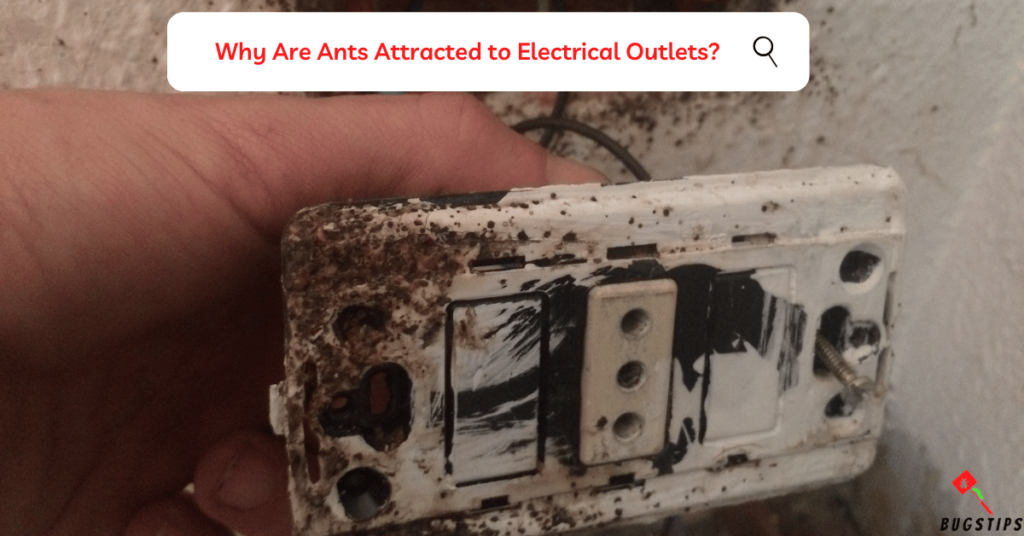
Ants are attracted to electrical outlets for a variety of reasons.
One of the primary reasons is that electrical outlets provide a warm and safe environment for ants to build their nests. Additionally, electrical outlets often emit a slight vibration, which can be attractive to ants looking for a new home.
Related Article – Do Ants Like Heat?
Another reason why ants are drawn to electrical outlets is that they often contain small amounts of food particles that can attract ants seeking sustenance. These food particles can come from crumbs or spills that have made their way into the outlet.
And electrical outlets can provide a source of moisture for ants, which is essential for their survival. Moisture can accumulate around the outlet due to condensation or water leaks, and ants can sense this and be drawn to it.
So overall ants are drawn to electrical outlets because they offer a warm and safe environment, a slight vibration, and a potential source of food and moisture. Understanding why ants are attracted to electrical outlets is the first step in preventing them from invading your home.
Types of Ants That Typically Invade Electrical Equipment
There are several types of ants that are known to invade electrical equipment. Here are some commonly found ants in Electrical Outlets
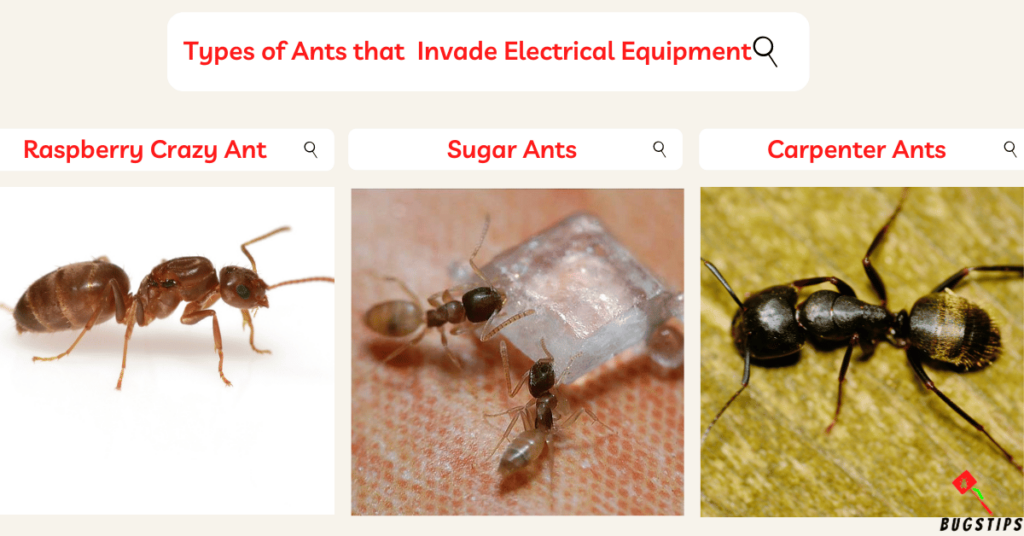
The Raspberry Crazy Ant
Also known as the Tawny Crazy Ant, is a common invader of electrical equipment. These tiny ants are about 1/8 of an inch long and have long antennae and reddish-brown legs. They are called “crazy ants” because of their erratic and unpredictable movements.
When they invade electrical outlets, they can cause damage by shorting out the circuits, leading to power outages and potential electrical fires. Raspberry Crazy Ants are attracted to electrical outlets because they provide warmth and moisture, which they need to survive.
Sugar Ants
Sugar ants, also known as banded sugar ants or coastal brown ants, are attracted to sugary substances, hence their name. They range in size from 2 to 15 mm and can have a variety of colors, with male sugar ants being completely black and female workers having orange-colored bodies.
These ants are known to invade electrical outlets in search of food sources and moisture, which can lead to potential damage to the outlets and electrical equipment.
Carpenter Ants
Carpenter ants come in various sizes ranging from 3.4 to 13 mm in length and are usually black, red, brown, yellow, orange, or red and black in color. However, size is not a reliable factor in identifying carpenter ants because workers within a species can vary in size.
Related Article – What Attracts Carpenter Ants
This can make it challenging to identify them in electronic outlets. Carpenter ants are known for their ability to cause damage to wooden structures and can also invade electrical equipment, including outlets.
They are attracted to moist environments and decaying wood, which could be why they find electrical outlets to be suitable locations. Once inside, they can cause short circuits and damage the wiring of electrical outlets.
Kamikaze Ants
Fire ants are a common type of ant that can invade electrical equipment. They are usually small, only measuring about 1/8″ to 1/4″ in length. Fire ants can be reddish-brown to black in color and are known for their painful stings.
They are typically found in warm climates and can be a nuisance in homes and outdoor areas. If they invade electrical outlets, they can cause damage and pose a fire hazard. It’s important to take precautions to prevent fire ants from entering your home and to address any infestations promptly.
Of these ants, the raspberry crazy ant and sugar ants are the most common culprits found in electrical outlets. However, it's important to note that any type of ant can potentially invade and cause damage to electrical equipment, so it's important to address the issue promptly.
How Do You Know if Ants Are in Electrical Outlets
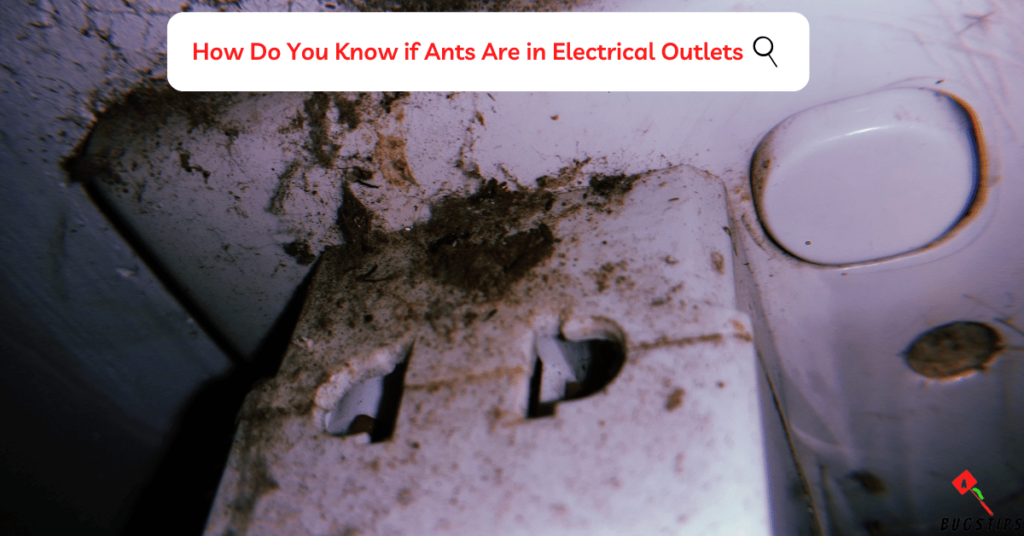
It can be difficult to know if ants are in electrical outlets, but here are some signs to look out for
- Seeing ants around the outlet – If you notice ants gathering around electrical outlets, it may be a sign that they have established a nest or colony inside. Keep an eye out for ants crawling in and out of the outlet or along the walls near the outlet as well.
- Hearing rustling or scratching sounds – If you hear rustling or scratching sounds coming from your electrical outlet, it could be a sign that ants have made their way inside.
- Smelling a musty odor – If you notice a musty or damp smell coming from an electrical outlet, it could be a sign of ants. Ants often build their nests in damp or moist areas, which can create a musty odor. If you smell this odor near an outlet, it’s best to have it inspected to determine if there are ants present.
- Noticing electrical problems – If you notice any electrical problems, such as flickering lights or outlets that don’t work properly, it could be a sign that ants have infiltrated the wiring.
- Seeing ant debris or waste near the outlet – If you see small piles of debris or waste around the electrical outlet, it may indicate that ants are nesting inside. Ants often leave behind droppings, discarded wings, and other debris as they make their nests. If you notice this type of debris, it’s a good idea to check the outlet for ants or other signs of infestation.
Related Article – Bed Bugs in Electronics
How Do Ants Go Inside Electrical Outlets?
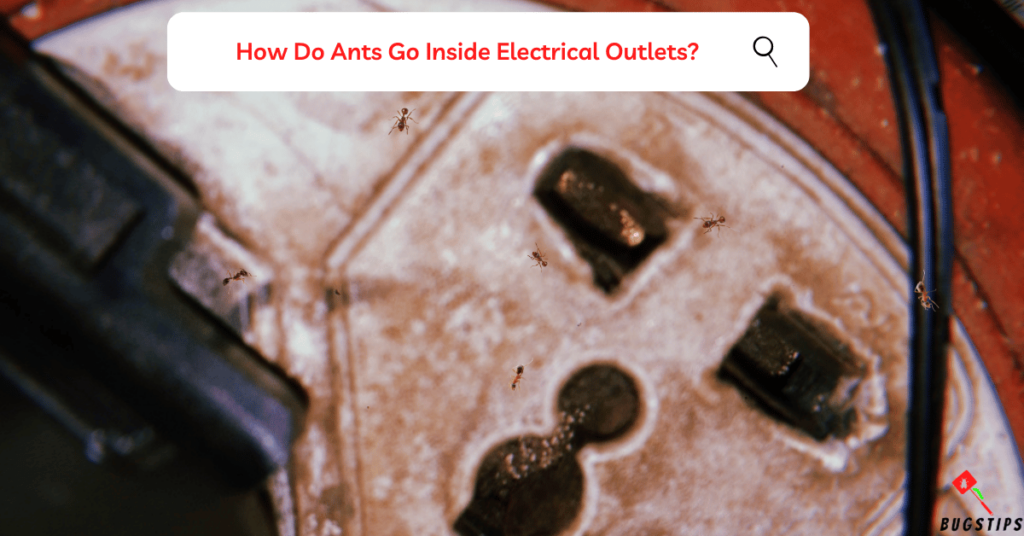
Ants can enter electrical outlets through small cracks or gaps in the outlet cover or around the wires. They can also use the holes or openings for the electrical wires to gain access to the outlet. Once inside, ants may build nests or travel through the wiring system to other parts of the building.
Ants are able to climb up and down walls and other surfaces using their sticky feet and strong legs. This allows them to easily access electrical outlets that may be located high up on walls or ceilings.
Additionally, some ants are small enough to fit through very small openings, making it easy for them to enter electrical outlets.
How Can Ants Damage Electrical Wiring And Equipment?
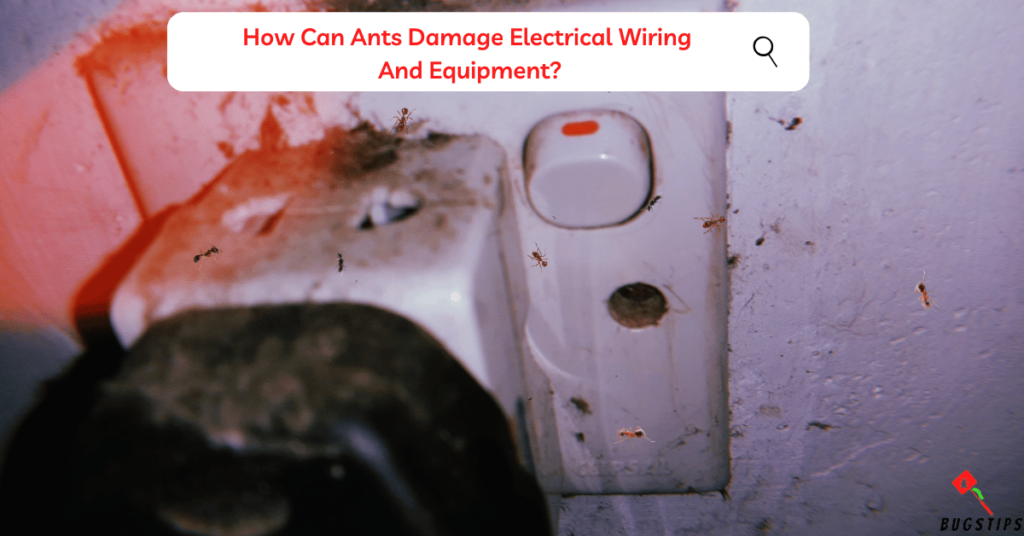
Ants can cause serious damage to electrical wiring and equipment.
One of the ways they can do this is by chewing through the wiring insulation. Ants are attracted to the warmth generated by electrical wiring and will sometimes chew through the insulation to access it. This can lead to exposed wiring, which can pose a fire hazard and increase the risk of electrical shock.
Another way that ants can cause damage is by building nests inside electrical equipment. Ants are known to build their nests in a variety of locations, including electrical boxes, outlets, and other equipment. Over time, these nests can cause damage to the equipment, leading to malfunctions, short circuits, and other problems.
Having ants in electrical outlets can pose a significant risk to both the equipment and the building’s occupants. Not only can it lead to damage to the equipment, but it can also increase the risk of electrical shock and fire.
It is important to address ant infestations in a timely manner to minimize the risk of damage and injury.
Can Ants in Electrical Outlets Start a Fire?
The question of whether ants in electrical outlets can start a fire is a complicated one. While ants themselves are not likely to start a fire, their presence in electrical equipment can increase the risk of electrical problems that could lead to a fire.
For example, if ants chew through wiring insulation and expose the wiring, it could lead to a short circuit and potentially start a fire.
Additionally, if ants build their nests inside electrical outlets or equipment, the heat generated by the equipment can cause the nest material to catch fire.
It is important to take the presence of ants in electrical outlets seriously and address the issue promptly to avoid potential fire hazards.
How to Get Ants Out of Electrical Outlets

If you’ve noticed ants in your electrical outlets, you’ll want to remove them as soon as possible to prevent any potential damage.
Caution: Dealing with electrical outlets and systems can be extremely dangerous. If ants have infested your electrical outlets, seek professional help from an exterminator. Before dealing with any electrical installations, turn off the power switches and proceed with caution. We will provide some tips on how to safely remove ants from electrical outlets, but seeking professional assistance is always the best course of action.
Here are some steps you can take to safely remove ants from your electrical outlets:
DIY Methods for Ant Removal from Electrical Outlets
If you notice ants in your electrical outlets, there are some household items you can use to try to safely remove them. Before attempting any of these methods, please remember to turn off the power switch to the affected outlet.
Peppermint Oil
Peppermint oil is a natural solution that can help repel ants from electrical outlets.
Mix a few drops of peppermint oil with water and apply the solution around the outlet. However, it is important to avoid spraying the mixture directly on the wires and inside the outlet to avoid short-circuiting.
Peppermint oil contains a strong scent that ants dislike, which can discourage them from entering the outlet. This method is safe and non-toxic, making it a good alternative to chemical insecticides. However, it may not be as effective as other methods, especially for larger ant infestations.
Cinnamon
Cinnamon can also be an effective natural remedy to get rid of ants in electrical outlets. Simply sprinkle ground cinnamon around the affected area, including the outlet and surrounding walls.
The strong scent of cinnamon will help deter the ants and prevent them from coming back.
It is important to note that cinnamon should not be sprayed directly into the outlet or on the wiring, as it could cause a short circuit or other electrical problems.
Vinegar
Vinegar is another household item that can help in removing ants from electrical outlets. Mix equal parts of water and white vinegar and pour the mixture into a spray bottle. Before using the mixture, turn off the power switches to the electrical outlets to avoid any risks of electric shock.
Spray the mixture directly onto the areas where the ants are present, such as the outlets or the surrounding areas. This will kill the ants on contact and also deter others from returning. Repeat this process daily until the ants are completely gone.
It is important to note that vinegar can corrode metal, so avoid spraying it directly onto electrical wires or metal components of the outlet. Use it only on the areas where the ants are present, and wipe away any excess vinegar after use.
Please note that while these DIY methods may work in some cases, they may not be effective for larger ant infestations or if the ants have already caused damage to the electrical wiring. It is always best to pay for Professional Products or seek professional help if you are unsure or if the infestation is severe.
Related Article – How To Get Rid of Ants in Bedroom
Use Professional insecticides
If you prefer not to use DIY methods or want a quicker solution to get rid of ants in electrical outlets, then using professional insecticide products may be the right choice for you. These products are specifically designed to target ants and can be more effective in eliminating them.
So here are some professional insecticide products that you can use to eliminate ants from your electrical outlets.
Ultrasonic Pest Repeller
You’ll Also Like – Does Lysol Kill Ants? Find Out the Truth
Home Plus Ant Killer
Ortho Home Defense Ant, Roach & Spider Killer2
TERRO T300B Liquid Ant Killer
These methods and products can help you effectively eliminate ants from your electrical outlets and prevent further infestations. It's important to always follow the instructions and precautions on the label when using insecticides or any other chemicals.
Call an Exterminator
If all else fails and the ant infestation in your electrical outlets persists, it is recommended to call a professional exterminator.
Exterminators have the knowledge, experience, and equipment necessary to effectively remove ants and prevent them from returning.
Related Article – What Chemicals Do Exterminators Use for Ants?
It is important to always follow the instructions and advice of the exterminator to ensure your safety and the effectiveness of the treatment.
What Not To Do When Trying To Remove Ants in Electrical Outlets
When trying to remove ants from electrical outlets, there are a few things that you should avoid doing:
- Don’t use water: Water can damage your electrical system and create a potentially dangerous situation. Avoid using water to remove ants from electrical outlets.
- Don’t use fire: Using fire to remove ants is not only dangerous, but it can also cause damage to your electrical system.
- Don’t use chemicals that are not safe: Using chemicals that are not safe can cause harm to you, your family, and your pets. Always read the label and use chemicals as directed.
- Don’t insert metal objects: Attempting to remove ants by inserting metal objects into the electrical outlet is extremely dangerous and can cause electrocution and serious injury.
- Don’t take unnecessary risks: Climbing ladders or reaching into tight spaces to remove ants can be dangerous. and do not attempt to handle electrical outlets or systems without proper knowledge and equipment, as this can result in serious injury or even death. Always prioritize your safety and call a professional if needed.
- Don’t ignore the problem: Ignoring the problem won’t make it go away. Ants can cause damage to your electrical system and pose a potential hazard. Take action to remove them as soon as possible.
Final Thoughts
Dealing with ants in electrical outlets can be a dangerous and frustrating problem. It’s important to remember that seeking professional help from an exterminator is always the best course of action to avoid injury and ensure effective removal.
However, if you choose to use DIY methods, natural solutions like peppermint oil, cinnamon, and vinegar can be effective in repelling ants. Avoid using water or sprays near electrical outlets, and never attempt to tamper with electrical installations without proper knowledge and equipment.
Remember to turn off the power switches before dealing with any electrical installations. With these tips, you can successfully remove ants in your electrical outlets and keep your home safe from potential hazards.
FAQs
Is it normal to have ants in my walls?
No, it is not normal to have ants in your walls. Ants may enter your home in search of food, water, or shelter, but they should not be living inside your walls.
What are ants that eat the electrical wires?
The ants that are known to eat electrical wires are called crazy raspberry ants. They are attracted to electrical current and can cause damage to electrical equipment.
What are the tiny black ants in my electronics?
The tiny black ants that you may find in your electronics are likely odorous house ants. They are attracted to the warmth and shelter that electronic devices provide.
Can ants trip GFCI outlets?
Yes, ants can potentially trip GFCI outlets if they come into contact with the electrical components. This is why it is important to address any ant infestations in your home as soon as possible.
Can ants affect electrical wiring?
Yes, ants can affect electrical wiring by chewing through the protective coatings and insulation, potentially causing shorts and other electrical problems.
Do ants lay eggs in walls?
Some species of ants may lay eggs in walls if they have established a nest inside the structure. However, it is not a common behavior for most ant species.
Can you put boric acid in outlets?
No, it is not recommended to put boric acid directly into electrical outlets. It is best to use ant baits and other methods that are safe for use around electrical equipment.
Is it safe to use ant baits and sprays near electrical outlets?
It is generally safe to use ant baits and sprays near electrical outlets as long as you follow the manufacturer’s instructions and avoid getting the products directly into the outlets.
Should I attempt to fix electrical damage caused by ants myself?
It is not recommended to attempt to fix electrical damage caused by ants yourself, as tampering with electrical systems can be dangerous. It is best to seek professional assistance from a licensed electrician.
Resources – (for further reading)
Texas Cooperative Extension, College Station – Managing Red Imported Fire Ants in Electrical Equipment and Utility Housings
Colorado State University – Ants in the Home – 5.518
Texas A&M University – Tawny (Rasberry) Crazy Ant, Nylanderia fulva


